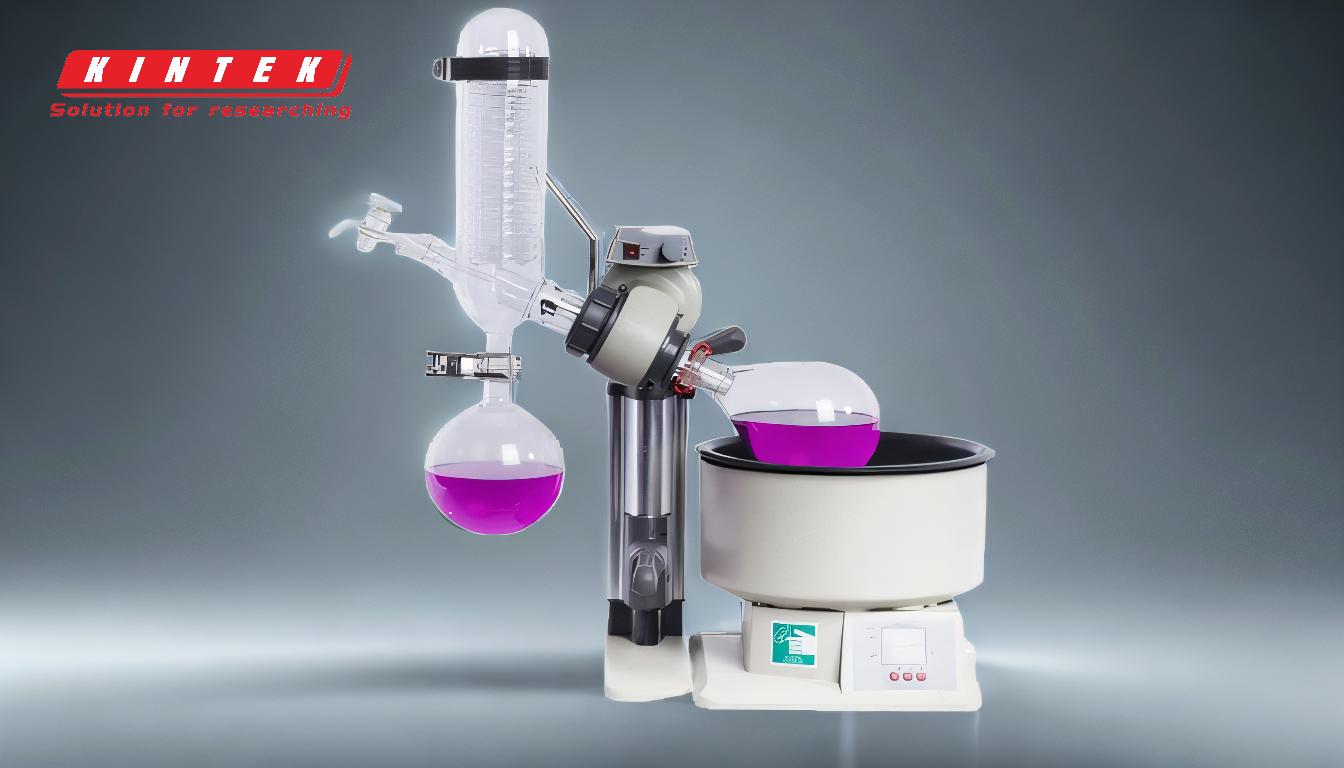When the pressure is reduced in rotary evaporation, it significantly impacts the distillation process by lowering the boiling points of solvents, enabling evaporation at lower temperatures. This is particularly beneficial for heat-sensitive materials, as it prevents thermal degradation and preserves the integrity of the sample. Lower pressure also enhances efficiency by saving time and energy. However, maintaining consistent pressure is crucial to avoid issues like bumping, foaming, or contamination. Proper pressure control ensures optimal separation of solvents and solutes, making the process more effective and reliable.
Key Points Explained:

-
Reduction of Boiling Points:
- Lowering pressure in a rotary evaporator reduces the boiling points of solvents. This is based on the principle that boiling occurs when the vapor pressure of a liquid equals the surrounding pressure.
- By reducing pressure, solvents can evaporate at much lower temperatures, which is especially useful for heat-sensitive compounds that might degrade at higher temperatures.
-
Energy and Time Efficiency:
- Distilling at lower temperatures due to reduced pressure saves energy, as less heat is required to achieve evaporation.
- The process becomes faster because solvents evaporate more readily under vacuum conditions, reducing the overall distillation time.
-
Preservation of Sensitive Compounds:
- Lower temperatures prevent thermal degradation of heat-sensitive materials, such as aromas, flavors, or bioactive compounds.
- This ensures that the extracted solvents or solutes retain their original properties without being "cooked" or altered.
-
Prevention of Bumping and Foaming:
- Sudden pressure changes or improper pressure settings can cause bumping (violent boiling) or foaming, which can lead to contamination of the distillate or damage to the equipment.
- Maintaining a consistent vacuum helps avoid these issues, ensuring a smooth and controlled distillation process.
-
Improved Solvent Purity:
- A vacuum prevents air from entering the system, which could otherwise contaminate the solvents.
- This is particularly important for applications requiring high-purity solvents, such as in pharmaceutical or food industries.
-
Handling Complex Solvent-Solute Combinations:
- Lower pressure allows for the separation of complex mixtures without excessive heating, which is crucial for delicate or multi-component samples.
- This ensures that each component is isolated effectively without compromising its integrity.
-
Avoidance of Operational Issues:
- Improper pressure settings can lead to re-boiling, condenser overloading, or other operational challenges.
- These issues not only affect the quality of the distillate but also increase downtime for cleaning and maintenance.
-
Enhanced Process Control:
- Using an interface-controlled system to maintain consistent pressure values reduces fluctuations and ensures optimal performance.
- This level of control is essential for achieving reproducible and reliable results in rotary evaporation.
By understanding these key points, users can optimize their rotary evaporation processes, ensuring efficient, safe, and high-quality outcomes. Proper pressure management is a cornerstone of successful distillation, particularly when dealing with sensitive or complex materials.
Summary Table:
| Key Benefit | Explanation |
|---|---|
| Reduction of Boiling Points | Lowers solvent boiling points, enabling evaporation at lower temperatures. |
| Energy and Time Efficiency | Saves energy and reduces distillation time by evaporating solvents more quickly. |
| Preservation of Sensitive Compounds | Prevents thermal degradation of heat-sensitive materials. |
| Prevention of Bumping and Foaming | Ensures smooth distillation by maintaining consistent pressure. |
| Improved Solvent Purity | Prevents contamination by keeping air out of the system. |
| Handling Complex Mixtures | Separates delicate or multi-component samples effectively. |
| Avoidance of Operational Issues | Reduces re-boiling, condenser overloading, and maintenance downtime. |
| Enhanced Process Control | Ensures reproducible and reliable results through consistent pressure control. |
Optimize your rotary evaporation process today—contact our experts for tailored solutions!










